Lisa Witt is known around the world as that upbeat piano teacher on YouTube. But did you know that she’s also an artist who writes original songs? Today, we’re releasing a performance of Lisa’s original song “Four Walls.” It’s an absolute banger with a sweet story behind it. Here’s a (lightly edited and condensed) interview with Lisa on “Four Walls,” how she composes, and the role of music in her life.
Sign up to get the latest updates from Pianote — including free lessons, tips, articles, interviews, and more — delivered straight to your inbox every week. Unsubscribe at any time.
Once upon a time, my dad went out to buy me a car and came back with a piano instead. This piano became the highlight of the living room. We also had these big view windows, and behind the piano was this chair. When she was alive, my mom would sit in the chair and listen while I sang in the evenings.
Now, my mom never held still for anything else. She was constantly working, cleaning, organizing, doing things… But she would sit down when I played, and sometimes I wouldn’t even realize she was there.
So, after she passed, I was sitting at the piano and remembering that moment, that sentiment. I looked out the window and saw her roses. I saw her tree and I was feeling sad. And I looked at the piano and saw little fingernail prints on it, the little marks on the fallboard from hours of practice.
Then I started writing this song, thinking about the contrast between being inside a home where there are memories and being outside these four walls.
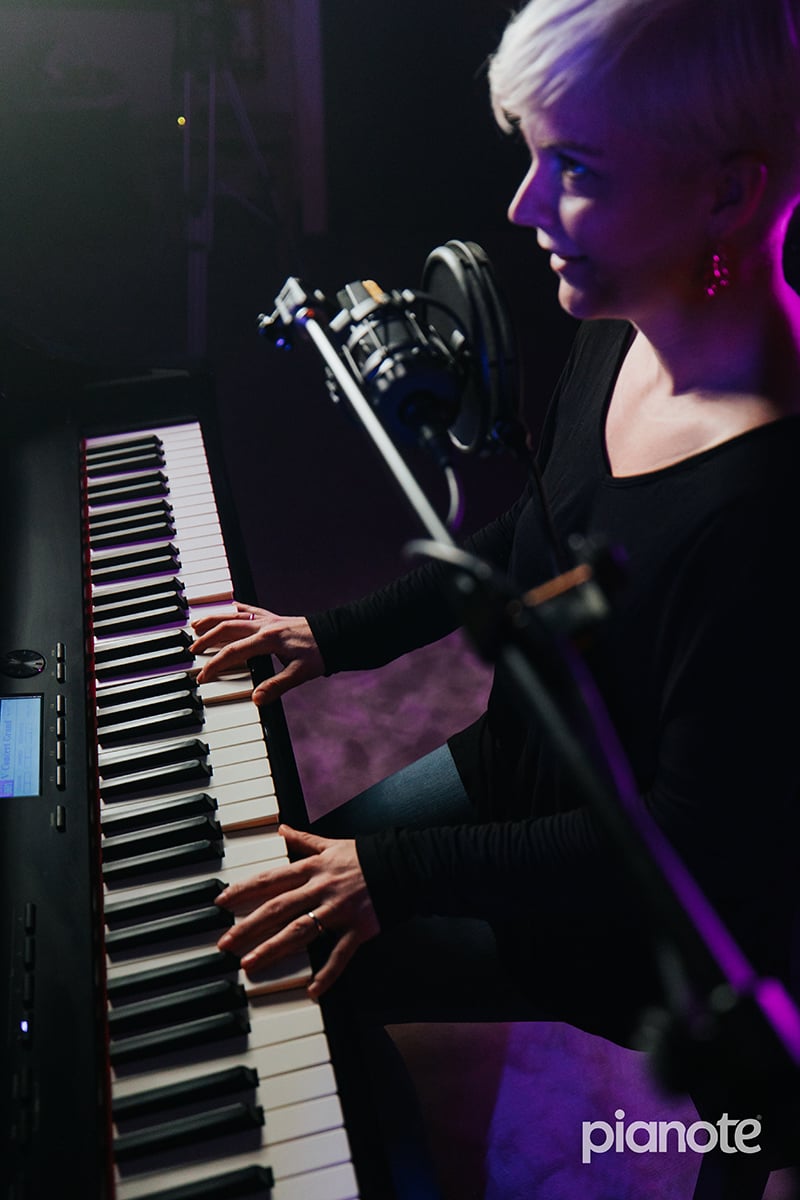
Once upon a time, my dad went out to buy me a car and came back with a piano instead.
Lisa Witt
Generally, I write words first. Then, I sit down at the piano and find a cool melody. And then, I scroll through my notes and see [what words I wrote before] work with it. And I go from there and just build.
Usually I write the lyrics first. But this one — and I’m not kidding you — I sat down and it just…it was one of those rare songs that completely wrote itself!
That’s a good question! I always challenge myself. If the last song I wrote was in F Major, I’ll try to make my next song in D Major. I typically stick with pop chords.
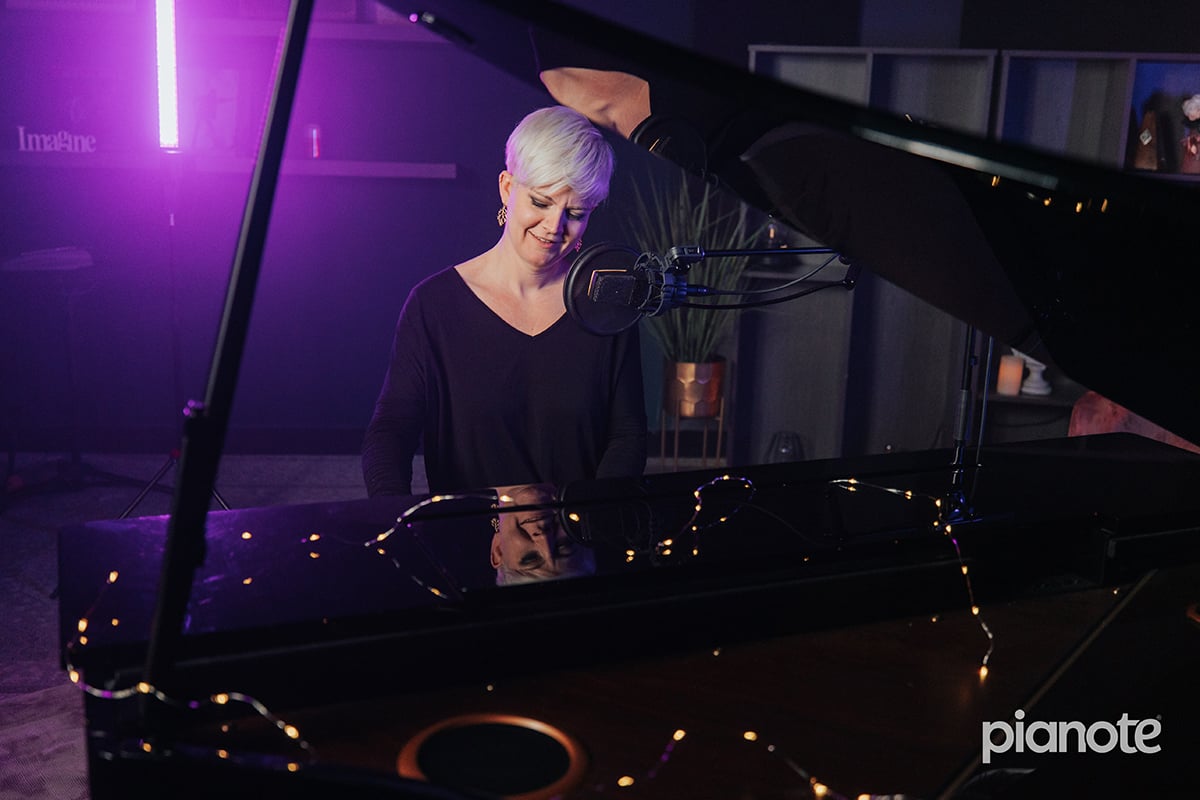
Often in pop music, the progression starts on the I chord. So I start with that, but I also think: what can I use instead of the I? Or, where can I go instead of the vi? Is there a different diatonic chord I can throw in?
And I’ll try to find a really cool sounding riff on the piano. I’ll take that and build chords around it, then add words.
🎹🤔 Why is Lisa talking about random numbers?? Lisa is talking about diatonic chords, or all the chords that exist within a scale. The chord built on the first note of the scale is the “one” (or I), the chord built on the fifth note is the V. A common chord progression in many pop songs is I-V-vi-IV.It’s brutal! Sometimes, for example, I’ll start on the I, then travel up quickly and use it like a passing note to the iii. So, I’ll go C-D-E…and then start my melody there. I try not to start in a “landed space.” Or I’ll go to the relative minor.
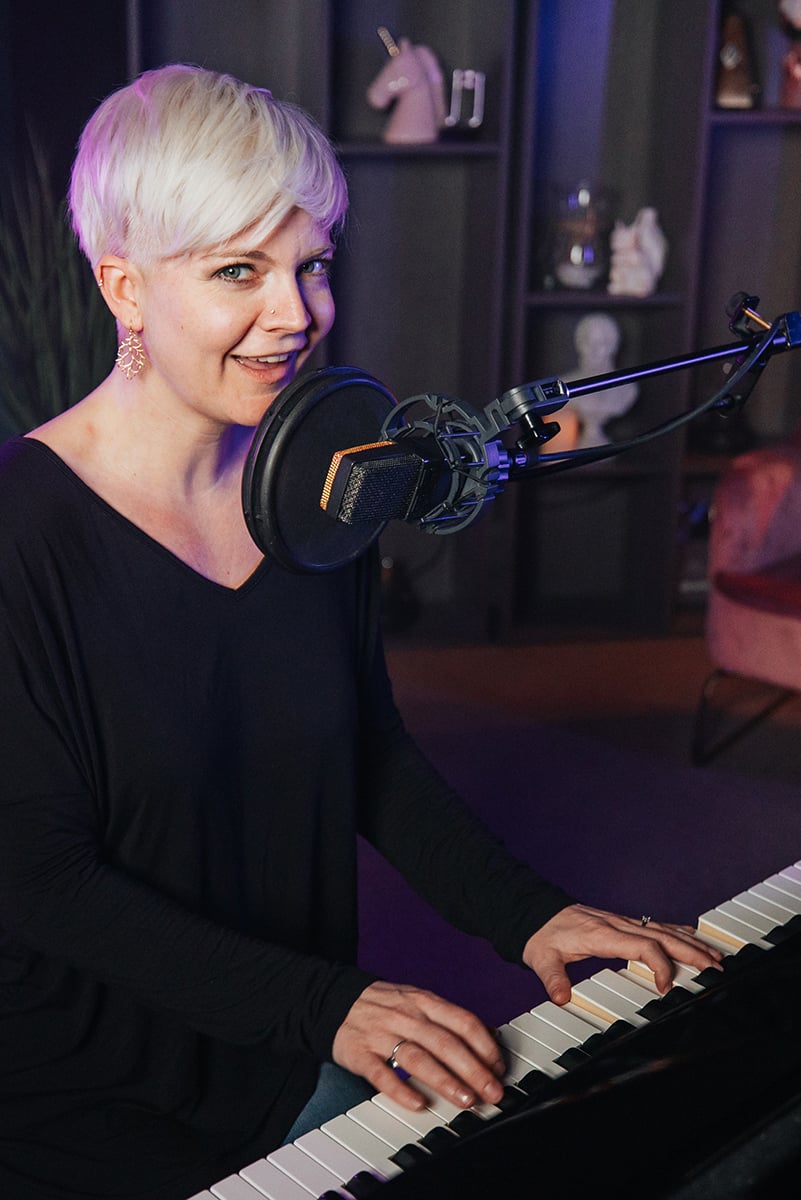
Another thing I love playing with is slash chords. I use them a lot. I love a consistent right hand chord — an anchor — and moving the left hand around creates this openness. I also like to space notes apart by ninths.
You have to only write for you. You can’t write for anybody else.
It’s so hard because we judge ourselves. If I think about creating a song that people will love, it creates too much pressure and the music never feels good enough. If I write for ME and me alone… that is when the magic happens.
At the end of the day, songwriting is a therapeutic tool. It’s there to help me process my life, my feelings, and my emotions, and to make sense of the world.
Authenticity is the most attractive thing, and it’s what draws people in. So, if you can be authentic and not write for somebody or something, that’s when you get the best results.
I love horses and I would write about the freedom I experience when I’m on one. Then I’d probably take that and disguise it under an idea of love.
You have to only write for you. You can’t write for anybody else.
Lisa Witt
At the end of the day, nobody really has to know what you’re talking about or what started it. You take your inspiration and shape it into what it needs to be.
I would say, for me…my inspiration is pain, honestly. People often ask how I am so positive and optimistic. Well, I still experience incredible amounts of sadness, grief, and pain. I’m just processing them [through music]. That’s where my sadness comes to hang out with me. And I think that it’s important for everyone [to have an outlet for pain].
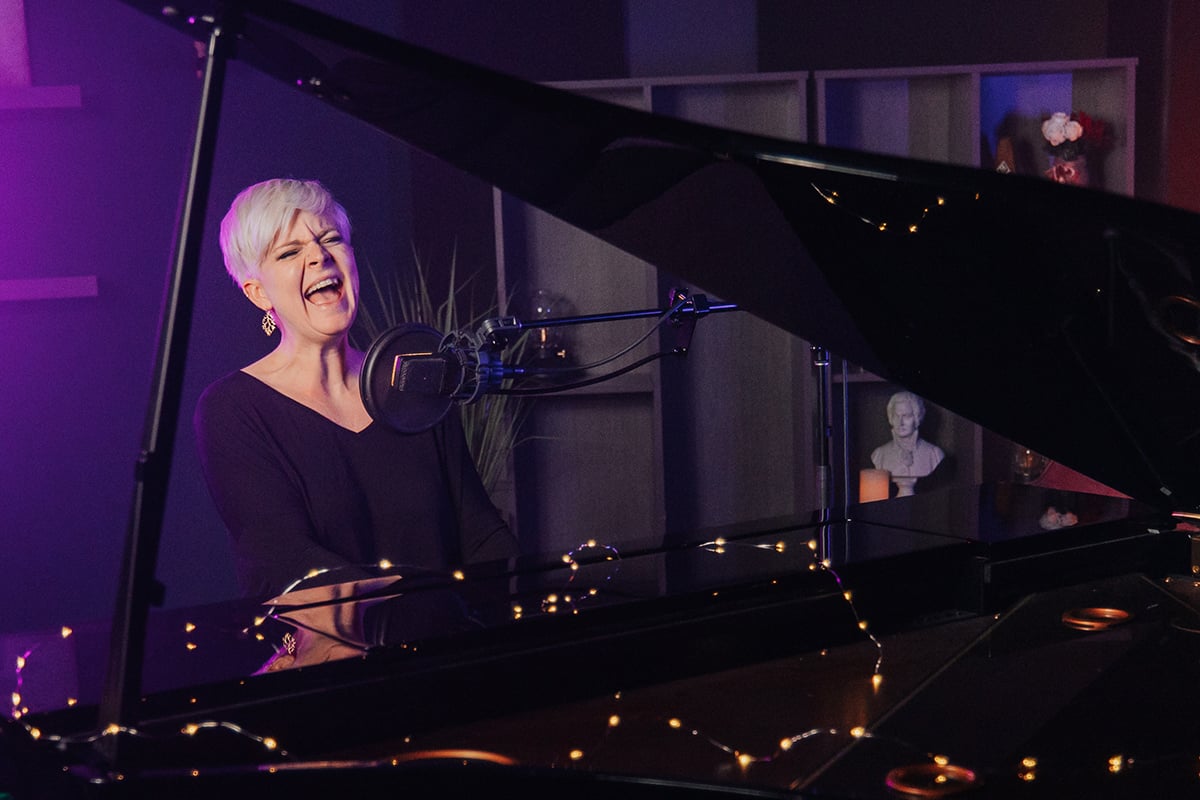
Yeah. There’s always some level of relationship drama happening. So I often return to telling that story. I think that’s pretty normal for all of us.
“Four Walls” is really about grief. Not fitting in is another theme. These are all things I process with a pen and a melody.
I do find that I tend to gravitate towards inspiration from nature. I recently wrote about the sun — or, I wrote to the sun. That was really cool.
“Four Walls” was similar — there’s a lot of plant life in that song! So, yes, nature is really inspiring for me and there are so many lessons to be learned from watching the outside. So that comes out in songs.
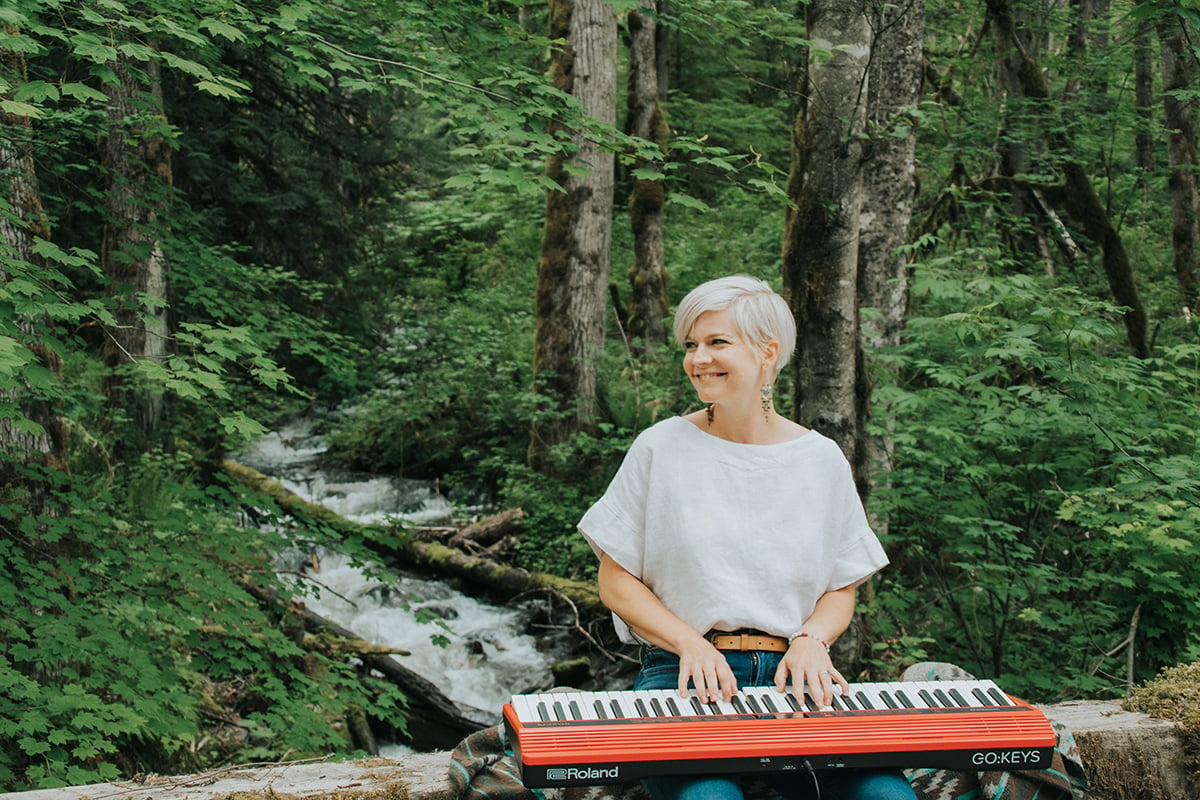
Honestly, I think it’s pretty basic. You don’t need to be very good at the piano to write songs on it. Because writing songs is just exploring. I get so excited about what I’ve done with Pianote because all you need to write a song is a scale and the chords that belong to that scale. Thats the focus of a LOT of what we do inside Pianote.
🎹🔥 Chords: Piano’s Secret Weapon! If you know chords, you’ll unlock hundreds of songs, along with the ability to compose. To learn more, check out this lesson: A Piano Player’s Best Kept Secret.A lot of my songs are in F Major. Lately, I’ve been playing with F Major, B-flat Major, and D Minor, and I like having those pop chords together.
It’s just what happens! I always tell my students: when you cover a song, to find the original key and then go down or up half a step. Find your sweet spot.
For some reason, it’s always the sharp keys that the voice wants to be in…
Whiskey is tool number one! Just so I can be vulnerable enough to write something honest 😉
Otherwise, I use my phone and Voice Memo app. I put my phone on my piano and type out lyrics on my MacBook or notebook. And I’ll often end up with about five voice memos on one song idea.
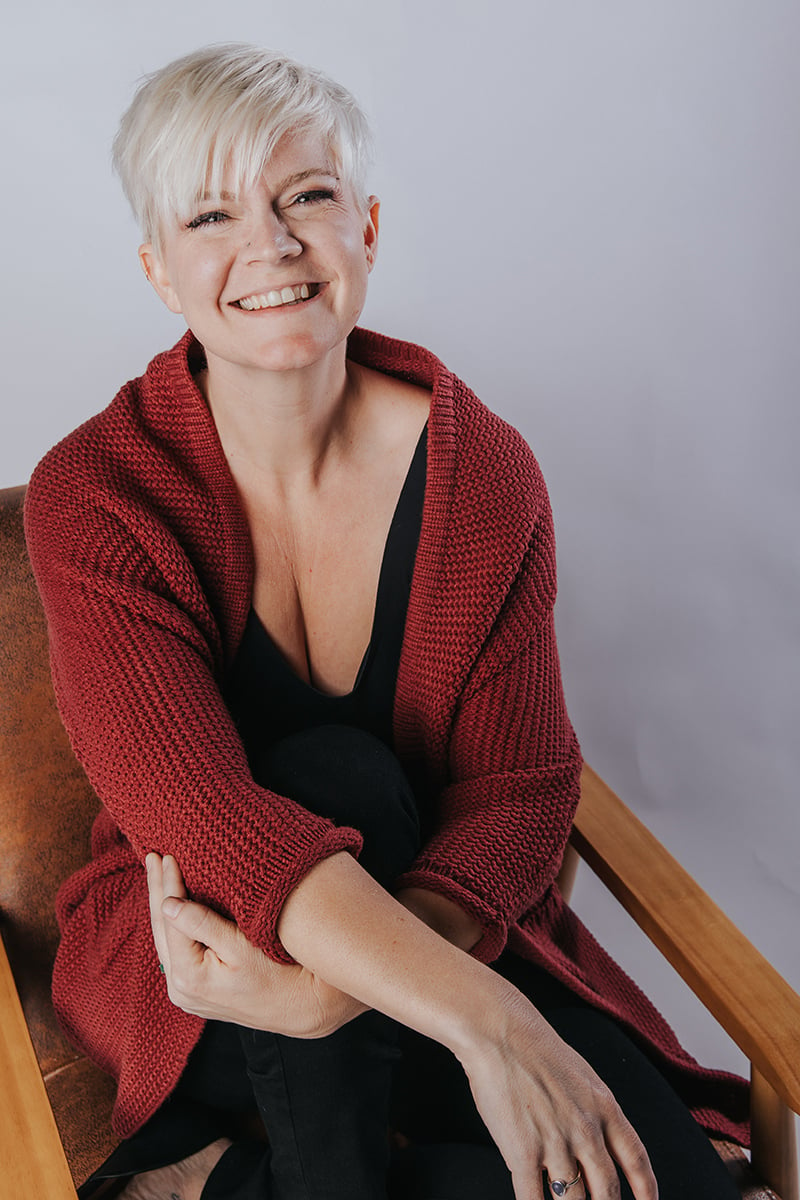
My next step is, I’ve got an interface that I’m going to purchase; everything else I have at home. [With these tools,] I’ll start recording the piano and vocals. That gives me what I need to get these songs produced.
We’re sure many of you are excited for Lisa’s debut album!
Lisa’s next step is to find a producer that deeply understands her “energy” and “heart.” Songwriting is a process, and Lisa doesn’t approach production with everything planned. She likes to collaborate with co-writers and producers who share a similar vision.
Another thing Lisa does is build soundscapes and moodboards out of existing favorite tracks. So, if there’s a song on Spotify where she loves a certain five seconds of, she’ll tell her team that she wants something like that in her own song.
She will likely do some fundraising and awareness-building to determine a budget before hiring a producer. Let’s all wish Lisa the best of luck on her debut!
We all need as many outlets as we possibly can to process life. Because life is hard. And beautiful. And…the piano is such a beautiful way…to start that process. The piano is an instrument that allows you to create melody, and harmony, and rhythm, and bass in one spot. And I think that that’s just really, really inspiring and cool.
Lisa Witt
Charmaine Li is a Vancouver writer who has played piano for over 20 years. She holds an Associate diploma (ARCT) from the Royal Conservatory of Music and loves writing about the ways in which music—and music learning—affects the human experience. Charmaine manages The Note. Learn more about Charmaine here.


By signing up you’ll also receive our ongoing free lessons and special offers. Don’t worry, we value your privacy and you can unsubscribe at any time.
We use cookies for traffic data and advertising. Cookie Policy »